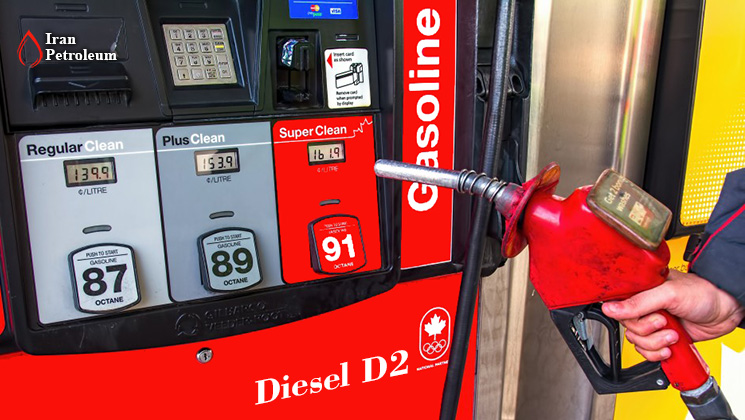Gasoline D2 or Diesel D2 in Iran
A refinery abbreviation for Gasoil is Diesel D2 or Gasoline D2. Unlike crude distillate, it does not require reformers or additives for use. Before petrol cars as we know them today were invented, diesel engines used D2 as fuel. This is due to the fact that a German engine called Diesel requires no spark plugs. When pressure increases, the diesel engine will ignite and combust so that the heated “plug” explodes. As a result, diesel engines are based on the same principles. As a result, the refinery will add additives to the automotive diesel that you fill to make the engine more efficient and easier to start over the winter season.
The “Flash Point” of diesel changes in the winter, according to the small print. Like petrol, diesel also has additives to absorb water that condenses in the cylinder – but because the nozzles are injected directly into the cylinder, ice will destroy the nozzles before the engine. Your fuel pipes may freeze and burst if you use summer diesel in the winter, and the wax can make the diesel flow thicker. Summer diesel gives you better mileage, but you will have to deal with more fuel pipe freezing and bursts.
The role of sulfur in GASOIL and Diesel D2
It is the sulfur content of GASOIL and Gasoline D2 that makes them different. A limit of 4% sulfur in GASOIL was introduced by the US EPA 10 years ago, while Europe and the rest of the world followed later. Most of the time, when sulfur needs to be removed, ways of doing it more efficiently are quickly discovered. Sulfur can now be traded profitably with sulfuric acid, which is now motivating farmers to extract as much as possible.
In essence, ‘Low Sulphur Gasoil‘ is now below 0.2% rather than 4%. As for Ultra Low Sulphur, it has a maximum sulfur content of 0.02%, and there are two limitations here: (a) mass spectrographs need extensive calibration to measure below 1000ppm, and (b) sulfur can form clogs. As explained above, Diesel D2 is a distillate, and it has not been “cracked” by the refinery. As a result, the molecules bind to free hydrogen molecules, forming a cluster that will break. The average sulfur content in a barrel is less than 0.02%, so you only got a cluster of molecules in your pint of ULSG.
Oil companies standard for production Diesel D2
Oil companies use a standard for Gasoline D2 or Diesel D2 from the International Standardization Organization – ISO.
As a result of proposals from ASTM, API, and EPA, ANSI has defined the US national standard for Diesel D2.
There are national variants in Europe, for instance, DIN in Germany, and GOST in Russia.
According to the ISO standard, the GOST variant for D2/Gasoil has a maximum sulfur content of 0.02 MAX. As the ANSI standard, it calls it “Ultra Low Sulphur”, and 0,2% (2000ppm) will be referred to as “Low Sulphur”. Many cities have reduced their pollution as a result of the reduction of sulfur in their gasoil.
Click on the link below to read more:

